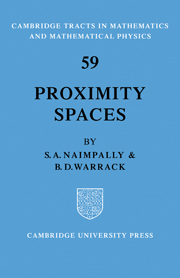Summary
This tract aims at providing a compact introduction to the theory of proximity spaces and their generalizations. It is hoped that a study of the tract will better enable the reader to understand the current literature. In view of the fact that research material on proximity spaces is scattered and growing rapidly, the need for such a survey is apparent. The material herein is self-contained except for a basic knowledge of topological and uniform spaces, as can be found in standard texts such as the one by John L. Kelley; in fact, for the most part, we use Kelley's notation and terminology.
The tract begins with a brief history of the subject. The first two chapters give the fundamentals and the pace of development is rather slow. We have tried to motivate definitions and theorems with the help of metric and uniform spaces; a knowledge of the latter is, however, not necessary in understanding the proofs. The main result in these two chapters is the existence of the Smirnov compactification, which is proved using clusters. Taking advantage of hindsight, several proofs have been considerably simplified.
A reader not acquainted with uniform spaces will find it necessary to become familiar with such spaces before reading the third chapter. In this chapter, the interrelationships between proximity structures and uniform structures are considered and, since proximity spaces are intermediate between topological and uniform spaces, some of the most exciting results are to be found in this part of the tract.
Information
- Type
- Chapter
- Information
- Proximity Spaces , pp. vii - viiiPublisher: Cambridge University PressPrint publication year: 1971
